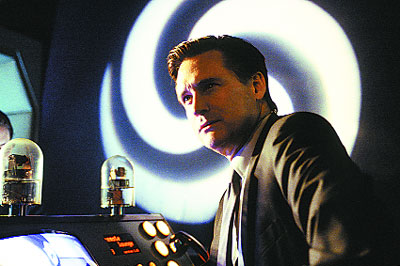Bill Pullman stars as an Everyman numbed by his daily routine and his grief
“Rick,” based loosely on Verdi’s opera “Rigoletto,” starts from the same premise of another movie now playing, “The Corporation”––that if the capitalist corporation were a person, it would be a psychopath.
It’s not the most original notion. “American Psycho,” both the book and the film, involved the same conceit. However, “Rick” has more on its mind than shock value. Neil LaBute’s “In The Company Of Men” also comes to mind, but director Curtiss Clayton and screenwriter Daniel Handler aren’t misanthropes. In a world of casual cruelty, they’re interested in tracking the faint traces of heart and conscience.
Rick O’Lette (Bill Pullman) works for the Image Corporation. One day at work, he is supposed to interview Michelle (Sandra Oh), but instead blows her off to surf sports websites, humiliating her. That night, he runs into her where she works as a waitress, at the Remote Lounge, an East Village club filled with surveillance cameras, and manages to get her fired. In turn, Michelle places a curse on him––“You are an evil person with an evil soul, and it will come right back at you.” In the same club outing, Rick also offends his boss Duke (Aaron Stanford), who leaves, but runs into an old classmate, Buck (Dylan Baker). Buck hands him a cryptic business card and brags “my own company” will “take the rat race to the next level.” Rick learns Buck is a hitman, and soon after discovers that his teenage daughter Eve (Agnes Bruckner) has been corresponding with Duke in a sex chat room. Suddenly, he sees a need for Buck’s services.
Despite the small budget ($1 million), “Rick” looks quite attractive. Clayton has a great eye for geometrical compositions, often including frames within frames. He likes filming off computer and video monitors, a technique that suggests that the characters are constantly under someone else’s watch, echoing the paranoia suggested by the Remote Lounge’s surveillance cameras
The film presents an unusual view of Manhattan. There are few exteriors. Rick’s office is surprisingly spacious. In fact, all the interiors seem too large and empty for comfort, especially when Rick and Eve race around a storage facility looking for his locker.
Michael Douglas spent much of the 1990s playing uptight, middle-aged jerks and would have been perfect for the role of Rick. Nonetheless, Pullman, whose face is puffy but still handsome, was an excellent choice. It’s a fairly complicated part, since Rick starts out as such a jerk. In the film’s opening, he’s the only person in his office who refuses to buy a $10 charity chocolate bar. As a conversationalist, he’s curt. Handler’s stylized dialogue in the early scenes suggests a David Mamet parody.
But Rick reaches an emotional breakthrough while talking with Eve in the oversized storage room, digging through old records. Only then does he recognize that corporate nastiness has numbed him morally and that his wife’s death has numbed him emotionally. The real story of “Rick” lies in the way he tries to break out of that coldness––a little too late and also halfheartedly.
Clayton and Handler are more humanistic than Mamet or LaBute, but I’m not sure if that helps or hurts. Though Rick clearly must change, once he does, the film never regains its early bracingly dark wit. As its protagonist becomes more complex, the film pulls more and more of its punches. The ending turns it into a fairly pat morality tale. Avoiding facile nihilism, it instead skirts sentimentality.
The film also strains for an anti-capitalist political allegory that doesn’t quite work, since many of Rick’s problems can be traced to his wife’s death. A biting black comedy turns into a variation on “Scrooged.” Nevertheless, it puts its finger on a very real brand of modern heartlessness and anomie.
































